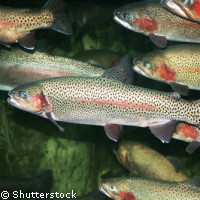Study highlights benefits of non-native fish
The majority of non-native fish introduced to freshwater habitats actually do more good than harm, according to a new study. The author, Dr Rodolphe Gozlan of the University of Bournemouth in the UK, claims that the small risks associated with the introduction of new species are often over-assessed, and calls for a critical debate on the real threats posed by non-native fish. The work, which was supported by the EU, is published in the journal Fish and Fisheries. Dr Gozlan analysed data from the Food and Agriculture Organisation (FAO) and FishBase on 103 non-native freshwater fish species introduced worldwide. He found that over half were reported to have no adverse ecological impact on their new environment, and the risk of ecological impact following introduction was less that 10% for most (84%) of the species studied. Examples of introductions which have brought about numerous benefits include rainbow trout from North America, catfish from Africa and carp from Asia to Europe. Furthermore, he states that introduced species which are widely accepted as being damaging to ecosystems, such as zebra mussels in America's Great Lakes, are not always evaluated against other environmental pressures such as habitat destruction or overfishing. According to Dr Gozlan, a major problem is that the small risks of non-native species are often over assessed, leading to the presumption that all such introductions must pose a threat to biodiversity. This perception is not helped by the fact that most research in the field focuses on the relatively small number of negative cases. With natural fisheries in decline, our dependence on aquaculture is set to increase, raising the risk of more freshwater fish introductions in the future. 'Looking into the future, the environmental changes that freshwater ecosystems may encounter will have inevitable implications on the distribution of our native freshwater fish species and the need to rely on non-native introductions may become a growing reality,' Dr Gozlan argues in his paper. 'With it the number of freshwater fish introductions will increase and a more realistic attitude, albeit controversial, will need to be debated.' This will mean protecting introductions which have a beneficial impact on diversity, while maintaining bans on the introductions of species or families of fish which have a higher ecological risk, states Dr Gozlan. Supporting such a measure will entail educating the public so that they can understand the ecological and economic benefits to be gained by the appropriate introduction of non-native species. 'The public perception of risk is something which cannot be ignored by any government or ruling body, but in order to gain public support in the fight for conservation of freshwater fish biodiversity, the message needs to be clear, detailed and educational,' Dr Gozlan concludes.

